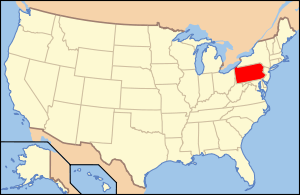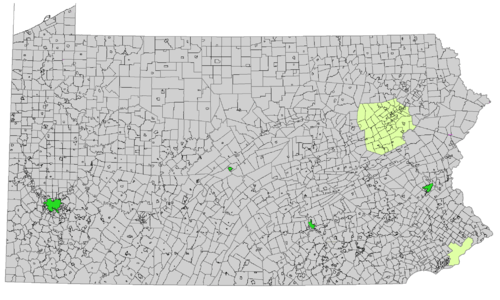LGBT rights in Pennsylvania
| LGBT rights in Pennsylvania | |
|---|---|
 | |
| Same-sex sexual activity legal? |
Legal since 1980 (Legislative repeal in 1995) |
| Gender identity/expression | Transgender individuals allowed to change legal gender on birth certificate and driver's license. |
| Discrimination protections | No statewide protection for sexual orientation or gender identity. Executive order is in place to protect state employees from this discrimination though. |
| Family rights | |
| Recognition of relationships | Same-sex marriage legal since 2014 |
| Adoption | Yes |
Lesbian, gay, bisexual, and transgender (LGBT) persons in the U.S. state of Pennsylvania face some legal challenges and discrimination not experienced by non-LGBT residents. Same-sex sexual activity is legal in Pennsylvania. Same-sex couples and families headed by same-sex couples are not eligible for all of the protections available to opposite-sex married couples. Pennsylvania was the final Mid-Atlantic state without same-sex marriage, indeed lacking any form of same-sex recognition law until its statutory ban was overturned on May 20, 2014.
Legality of same-sex sexual activity
Pennsylvania has repealed its sodomy statutes incrementally. In 1972, legislation legalized consensual sodomy for heterosexual married couples. In 1980, the Supreme Court of Pennsylvania ruling in Commonwealth v. Bonadio found Pennsylvania's sodomy law unconstitutional as violating the equal protection guarantees of both the state and federal constitutions.[1] Pennsylvania repealed its remaining sodomy laws in 1995.
Recognition of same-sex relationships

Same-sex marriage was legalized in Pennsylvania on May 20, 2014, when U.S. District Court Judge John E. Jones III ruled in Whitewood v. Wolf that the state's statutory ban on such marriages was unconstitutional.[2] After the ACLU filed the lawsuit in federal court on July 9, 2013, Attorney General Kathleen Kane said she would refuse to defend the statute.[3]
Previously, Pennsylvania did not recognize same-sex marriages, civil unions, or domestic partnerships. Attempts had been made in recent years to allow for such unions. There had also been attempts to amend the State Constitution to prohibit same-sex marriage.
Local domestic partnerships
While domestic partnerships were never offered statewide, the city of Philadelphia offers 'life partnerships' in the case of a "long-term committed relationship between two unmarried individuals of the same gender who are residents of the City of Philadelphia; or one of whom is employed in the City, owns real property in the City, owns and operates a business in the City, or is a recipient of or has a vested interest in employee benefits from the City of Philadelphia."[4][5] The city of Pittsburgh also provides domestic partnerships.[6] County employees in Luzerne County are required to identify if they are in a domestic partnership, which is explicitly defined as being between people of the same gender.[7]
Adoption and parenting
Pennsylvania allows a single person to adopt without respect to sexual orientation.[8]
Until 2002, Pennsylvania did not permit stepchild adoption by a person of the same sex as the first parent. A 6-0 ruling by the Supreme Court of Pennsylvania established the right of same-sex couples to stepchild adoptions.[9] No statute prohibits a same-sex couple from adopting a child jointly.[8]
Hate crime laws
Pennsylvania passed a hate crime law in 2002 that covered LGBT people,[10] but the Pennsylvania Supreme Court struck it down in 2008 on a technicality: legislators inserted the language into an unrelated bill on agricultural terrorism, changing that bill's purpose during the legislative process, which violates the Pennsylvania Constitution.[11] Legislation was introduced in several sessions to reinstate the law, but it never made it out of committee.[12][13][14]
Discrimination protections

There are statewide executive orders protecting LGBT individuals from workplace discrimination. In 1975, Pennsylvania became the first U.S. state in which an executive order was issued providing for discrimination protection on the basis of sexual orientation in state employment.[15] In 2003, gender identity was added to this executive order and the order has been reissued by every governor since then. On April 7, 2016, Governor Tom Wolf signed two executive orders, the first order prohibiting discrimination against state employees based on their sexual orientation, gender identity, HIV status and other factors and the second mandate banning state contractors from discriminating against their LGBT employees.[16]
For more than ten years, legislation that would protect LGBT people statewide from discrimination based on sexual orientation or gender identity has awaited action in the Pennsylvania General Assembly.[17] On December 17, 2013, Governor Tom Corbett announced his support for such legislation with respect to sexual orientation after learning that federal law did not already provide such protection as he had previously thought. He said he anticipated bipartisan support for the legislation.[18]
Many Pennsylvania municipalities and counties, including the five most populous cities, have enacted ordinances implementing such discrimination protections.[19]
Gender identity and expression
Sex reassignment surgery is legal in the state.
In August 2016, the Pennsylvania Department of Health changed requirements for transgender people to change their gender on their birth certificates. Sex reassignment surgery is no longer a requirement. Instead, transgender persons will just have to present a note from a physician stating that they have had appropriate clinical treatment for gender transition. Additionally, children under 18 who wish to change their gender on their birth certificate will need their parents to make the request.[20]
Conversion therapy
A bill to ban the use of conversion therapy on LGBT minors in Pennsylvania was introduced in the General Assembly in April 2015. The bill had 20 sponsors, all of whom were Democrats. The bill, however, died without any legislative action.[21]
Summary table
| Same-sex sexual activity legal | |
| Equal age of consent | |
| Anti-discrimination laws for sexual orientation | |
| Anti-discrimination laws for gender identity or expression | |
| Same-sex marriages | |
| Recognition of same-sex couples | |
| Stepchild adoption by same-sex couples | |
| Joint adoption by same-sex couples | |
| Gays, lesbians and bisexuals allowed to serve in the military | |
| Access to IVF for lesbians | |
| Homosexuality declassified as an illness | |
| Conversion therapy on minors outlawed | |
| MSMs allowed to donate blood | |
See also
References
- ↑ Shaman, Jeffrey M. (2008). Equality and Liberty in the Golden Age of State Constitutional Law. NY: Oxford University Press. p. 213.
- ↑ "Judge Rules for Marriage Equality in Pennsylvania". Advocate.com. May 20, 2014. Retrieved May 20, 2014.
- ↑ "Pennsylvania's A.G. Won't Even Defend Their Gay Marriage Ban in Court". The Atlantic Wire. July 11, 2013. Retrieved July 11, 2013.
- ↑ Philadelphia City Code § 9-1102.
- ↑ "Domestic Partnerships". Phila.gov. June 7, 1996. Retrieved December 1, 2011.
- ↑ "Ravenstahl Signs Legislation For Domestic Partner Registry". Thepittsburghchannel.com. June 22, 2008. Retrieved December 1, 2011.
- ↑ Michael P. Buffer (Staff Writer). "County code compels same-sex couples to identify relationship - News". Citizens Voice. Retrieved June 21, 2012.
- 1 2 "Pennsylvania Adoption Law". State Laws & Legislation. Retrieved January 25, 2013.
- ↑ "Pennsylvania: Gay Adoption Victory". New York Times. August 24, 2002. Retrieved January 25, 2013.
- ↑ "National Gay and Lesbian Task Force Applauds Governor Schweiker for Signing Bill Adding Sexual Orientation and Gender Identity To Existing Classes, December 3, 2002". Pennsylvania Expands Hate Crimes Law. National Gay and Lesbian Task Force. Retrieved January 25, 2013.
- ↑ Jalsevac, John (July 25, 2008). "Pennsylvania Supreme Court Rules that Homosexual 'Hate Crimes' Law Violates Pennsylvania Constitutio". LifeSiteNews. Retrieved January 25, 2013.
- ↑ "House Bill 745". Legis.state.pa.us. Retrieved December 5, 2013.
- ↑ "House Bill 177". Legis.state.pa.us. Retrieved September 22, 2014.
- ↑ "Senate Bill 42". Legis.state.pa.us. Retrieved September 22, 2014.
- ↑ Rimmerman, Craig A., Kenneth D. Wald, Clyde Wilcox. (2000). In The Politics of Gay Rights. University of Chicago Press. p. 272. ISBN 0-226-71999-5. Retrieved on January 23, 2011.
- ↑ Michael Lavers (7 April 2016). "Pennsylvania governor signs nondiscrimination executive orders". Washington Blade.
- ↑ "Record Number of Legislators Sign On as Co-sponsors of Bill to End Discrimination". Equality Pennsylvania. July 1, 2013.
- ↑ Worden, Amy (December 18, 2013). "Corbett backs ban on sexual orientation discrimination". Philadelphia Inquirer. Retrieved December 18, 2013.
- ↑ Tags: Ending Discrimination (June 6, 2013). "Pittston Passes Policy to Protect LGBT People from Discrimination". Equalitypa.org. Retrieved December 5, 2013.
- ↑ Pennsylvania makes it easier for transgender people to correct birth certificates Equality Pennsylvania
- ↑ PA HB935 | 2015-2016 | Regular Session